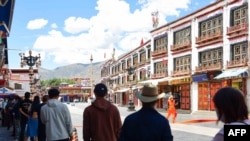Two of China's western frontier regions became lockdown zones this month with new outbreaks of COVID-19 in Xinjiang and Tibet. According to Chinese media, authorities have divided the COVID-affected areas of the autonomous region into high-risk, medium-risk and low-risk zones.
Xinjiang Uyghur Autonomous Region reported its first COVID-19 outbreak on July 31st. A week later, on August 6, Tibet announced that some people had been infected.
As of Thursday, Xinjiang had 329 high-risk areas, 138 intermediate-risk areas and 24 low-risk areas. On the same day, Chinese authorities in Tibet announced that there are 346 high-risk areas and 223 intermediate-risk areas.
According to the Chinese government newspaper Global Times, local authorities in Xinjiang and Tibet have implemented "static controls" in high- and medium-risk areas.
Static management refers to enforcing lockdowns in designated risk areas, thereby restricting people from moving out of their homes.
A variant of the omicron strain from outside China caused her COVID-19 infection in both Xinjiang and Tibet, according to a report in the Global Timeslast week.
However, Radio Free Asia reported last week thatnew infections in Xinjiang and Tibetwere brought by domestic Chinese tourists visiting the region.
Foreign tourists were not allowed to visit the area, even before this recent outbreak of COVID-19, according to Buchung Tsering, Interim Director of the International Campaign for Tibet.
"Tibet has been largely closed to foreign tourists for the last few years," he told his VOA. “While the COVID outbreaks in Lhasa, Shigatse and other towns appear to have been caused by the presence of travelers to the region, Tibetan residents have had to endure an inadequate medical system.

A Uyghur resident of Xinjiang, who requested anonymity for fear of retaliation from the Chinese government, told VOA under static conditions: rice field. Management, all the people in their apartment building, were deported to an unknown location.
"We were told to go to a quarantine station because a Chinese man who was found to be infected earlier came into our building," said a Uyghur. "The next morning, we found that the quarantine station we were brought into was a re-education detention center."
It is accused of subjecting Muslim groups to mass incarceration, torture, forced labor and forced sterilization. Rights groups such as Amnesty International have called on China to "release all people arbitrarily detained in concentration camps and prisons and close the concentration camps" in Xinjiang.
Beijing initially denied the existence of concentration camps. These facilities were then "vocational education and training centers" to help those affected by "religious extremism, terrorism and separatism", and all "students" graduated in late 2019. said.
China similarly expanded its “vocational” program in Tibet in 2020.
Uighurs today face "the most intrusive state-imposed surveillance" in the world, according to Peter Irwin, senior program officer for the Washington-based Uyghur Human Rights Project.
"The COVID-19 lockdown measures are giving Chinese authorities an additional pretext to confine Uyghurs and step up surveillance they are already accustomed to," Irwin told his VOA.
Chinese government newspaper Xinjiang Dailyreported Thursday that Ma Xingrui, secretary of the Communist Party of China's Xinjiang Uighur Autonomous Region, instilled in officials across the region the "spirit of General Secretary Xi Jinping." said it had to be implemented effectively. An important speech on epidemic prevention and control.
“Stick to the goal of a zero COVID policy. Do not relax. Decisively win the battle of prevention and control," said Ma.
Another Xinjiang resident, who requested anonymity for fear of retaliation from the Chinese government, said government officials blocked the door of his home so he could not leave the house.
"They open the seal when they perform his daily COVID test or when they bring in groceries," he told his VOA.
For Uyghurs, Tibetans and other ethnic groups, this new measure of control will add to the stress they are already facing, said the director of the Communist Victims Memorial Foundation in Washington. and his fellow in Chinese Studies, Adrian Zenz said.
"Given that Han Chinese [Chinese] tend to view these groups as 'dirty' and 'uncivilized', during the COVID outbreak, more severe treatment and We are likely to face tougher containment measures," Zenz told VOA.


